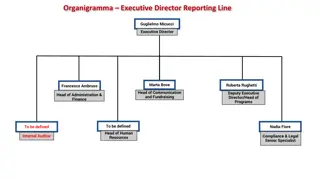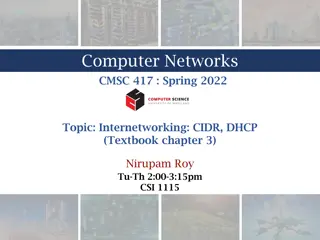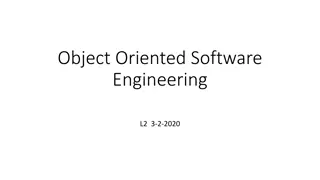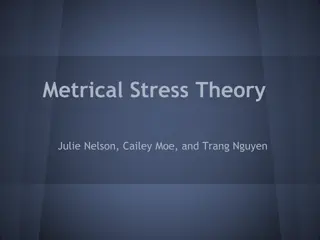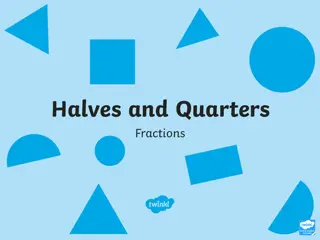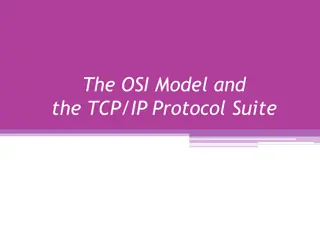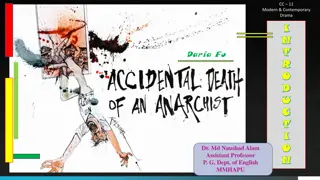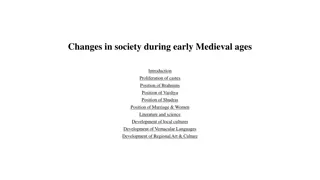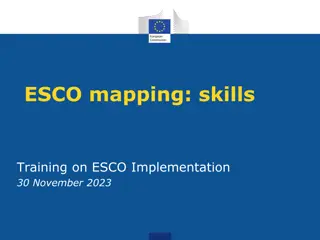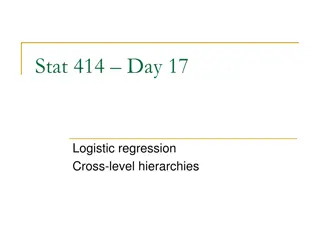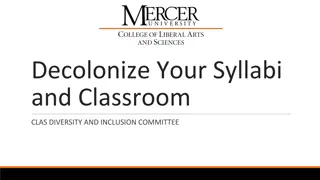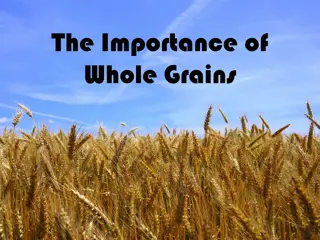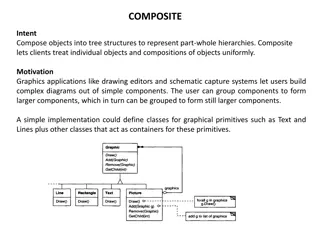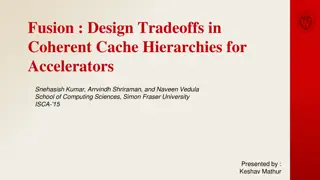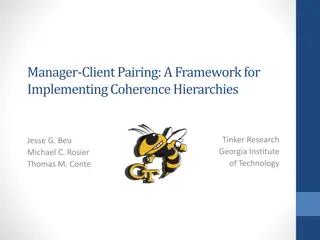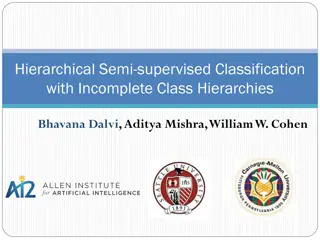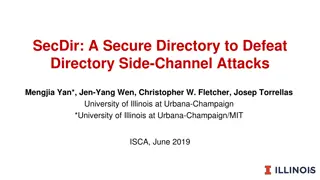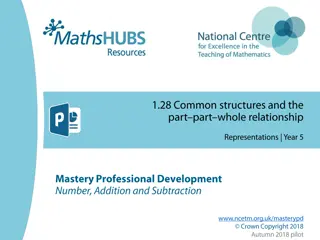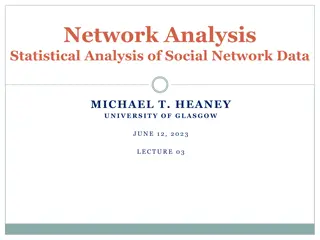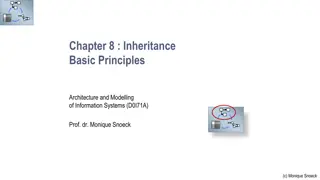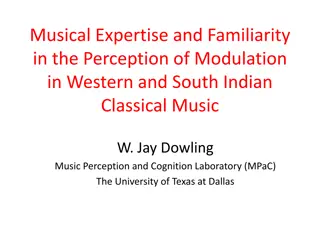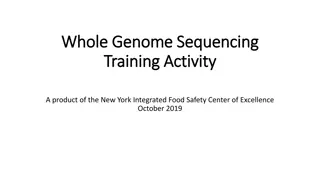Organizational Structure of a Nonprofit Organization
Detailed organigrams showcasing the reporting lines and roles within a nonprofit organization led by Executive Director Guglielmo Micucci. The structure includes departments like Communication & Fundraising, Human Resources, Administration & Finance, and Digital & Social Units, each headed by compet
0 views • 12 slides
Computer Networks CMSC 417 : Spring 2022
Exploring the concepts of Classless Interdomain Routing (CIDR) and Dynamic Host Configuration Protocol (DHCP) in the context of internetworking. CIDR simplifies subnetting by allowing for classless addressing, hiding network hierarchies, and enabling supernetting. Lessons learned from subnetting inc
0 views • 57 slides
Understanding Object-Oriented Software Engineering Principles
Explore the concepts of inheritance, generalization/specialization, UML representation, object/class relationships, multiplicity notations, and aggregation in object-oriented software engineering. Learn how methods and attributes can be inherited, grouped, and reused among classes, and understand th
0 views • 30 slides
Exploring Metrical Phonology: A Brief Overview
Metrical phonology, a subtheory of generative phonology, focuses on categorizing stress and stress rules within rhythmic hierarchies. It differs from generative phonology by not treating stress as a segmental feature specific to vowels. Originating from Halle's linear analysis, metrical stress theor
0 views • 32 slides
Policy Paper as Mode of Assessment in Modern Languages and Cultures
Policy papers are essential tools for communicating research findings and recommendations to policy actors. This assessment at Durham University involves writing a short policy paper aimed at a broad audience, focusing on a specific social issue. The process includes dissecting various parts of the
0 views • 9 slides
Understanding the Whole-Child Approach in Education
The whole-child approach in education emphasizes viewing children as complete beings, considering all aspects of their development including physical, cognitive, social, emotional, and more. Neglecting one area can impact overall growth. This holistic view is essential for effective learning and tea
1 views • 14 slides
Importance of Stakeholder Engagement in Health Policies
Understanding the role of non-governmental stakeholders in Health in All Policies (HiAP) and whole-of-society approaches is crucial for effective policy implementation. This module discusses the definition of stakeholders, benefits, challenges, principles for consultation, and strategies to countera
3 views • 25 slides
Exploring the Concept of Wholes and Parts Through Visual Representation
Illustrations depict the concept of fractions and wholes using visually engaging images of "One whole," "2 halves make a whole," "4 quarters make a whole," and "2 quarters make a half." These images serve as a helpful tool for understanding basic fractions in a clear and relatable manner.
2 views • 35 slides
Understanding OSI Model and TCP/IP Protocol Suite
Explore the concept of layering in data communication, comparing the OSI model and TCP/IP protocol suite. Learn about protocol layers, protocol hierarchies, and the functionality of each layer in these models. Discover the interrelationships between layers and the evolution from OSI to TCP/IP.
5 views • 57 slides
Analysis of Dario Fo's "Accidental Death of an Anarchist
Dario Fo's play "Accidental Death of an Anarchist" explores themes of police corruption, government collusion, and the suspicious death of an anarchist in police custody. The play delves into issues of impersonation, infiltration, and double-talk, shedding light on societal corruption and manipulati
0 views • 7 slides
Social Changes in Early Medieval India: Caste Proliferation and Hierarchies
Social changes during the early Medieval ages in India were shaped by economic developments, leading to the proliferation of castes and shifts in the positions of Brahmins, Vaishyas, and Shudras. The Brahmins held the highest social position, while Vaishyas were marginalized. The period also saw the
0 views • 11 slides
Understanding Whole Numbers and Basic Properties
Whole numbers are a collection that includes natural numbers and zero. They are denoted by the letter W and start from 0, 1, 2, 3, 4, 5, 6, and so on. The successor of a whole number is obtained by adding 1, and the predecessor is obtained by subtracting 1 (except for 0). The number line begins at 0
2 views • 7 slides
Technology-Enabled Visitor Experiences in Tourism
This material delves into the vital role of Information Technology in attracting visitors to attractions and events. It explores the various ways IT enhances visitor experiences through disruptive and moderating methods, providing insight into the management of visitors in attraction and event setti
0 views • 23 slides
AP World History Interactions in Early Urban Societies
Interactions in early urban societies, as depicted in inscriptions, provide insights into the development of trade networks, social hierarchies, and religious influences. Questions explore the context of inscriptions, social norms, and religious practices during specific historical periods.
0 views • 8 slides
Mapping Methodology for Establishing ESCO Relations
Learn how to set up teams, collect resources, compare classifications, and establish mapping relations for ESCO implementation projects. Get insights on using computer-assisted suggestions, updating mapping tables, and selecting mapping projects. Explore techniques for navigating classifications, br
1 views • 21 slides
Understanding H5 Files: A Practical Overview
H5 files, which stand for Hierarchical Data Format 5, store data in a structured manner, commonly used for storing weights in machine learning models. Exploring the contents of H5 files and dealing with unknown hierarchies can be challenging but essential tasks in data analysis. This presentation pr
0 views • 8 slides
Insights into Cultural Competence in Healthcare Settings
Explore the importance of cultural competence in healthcare through topics such as adapting to clinical and communication differences, understanding patient expectations, and building trust across diverse backgrounds. Learn how NHS professionals navigate hierarchies, challenges in authority, and the
1 views • 10 slides
Understanding Social Hierarchies in Animal Behavior
Social behavior in animals involves living in social groups, establishing social hierarchies, and exhibiting dominance behaviors. Animals have developed various signals and behaviors to interact successfully within these groups. Social hierarchies offer advantages such as increased chances of surviv
1 views • 20 slides
Understanding Logistic Regression in Multi-level Hierarchies
Explore the intricacies of logistic regression in cross-level hierarchies through helpful project advice, model graphs, and leftover considerations. Learn about transforming binary responses, interpreting log-odds, and conducting multilevel logistic regression with random intercepts. Dive into real-
0 views • 21 slides
Decolonize Your Syllabi and Classroom Workshop Overview
Explore the importance of decolonizing your syllabi and classroom to create inclusive environments. Understand the core concepts of diversity, inclusion, and decolonization in education. Learn how to rethink and reconstruct your course to amplify diverse voices and challenge colonial hierarchies. Di
0 views • 9 slides
Understanding the Importance of Whole Grains in a Healthy Diet
Whole grains play a vital role in a healthy diet, offering numerous benefits such as energy boost, disease prevention, antioxidant properties, and weight control. This article highlights the recommended daily intake of whole grains, examples of whole wheat products, and tips for identifying whole gr
0 views • 9 slides
Reformulating with Whole Grains: Key Considerations and Guidelines
Understanding the importance of reformulating with whole grains involves key issues such as defining whole grains, ensuring food safety, maintaining grain quality, and adhering to national regulations. It is essential to follow guidelines on whole grain ingredients, food safety practices, and the de
0 views • 14 slides
Understanding the Composite Design Pattern in Object-Oriented Programming
The Composite design pattern allows clients to treat individual objects and compositions of objects uniformly, enabling the representation of part-whole hierarchies in tree structures. This pattern is commonly used in graphics applications to create complex diagrams from simple components, allowing
0 views • 43 slides
Tradeoffs in Coherent Cache Hierarchies for Accelerators
Explore the design tradeoffs and implementation details of coherent cache hierarchies for accelerators in the context of specialized hardware. The presentation covers motivation, proposed design, evaluation methods, results, and conclusions, highlighting the need for accelerators and considerations
0 views • 22 slides
Efficient Manager-Client Pairing for Coherence Hierarchies
Addressing the challenges in designing and integrating coherence protocols, this framework emphasizes using existing protocols as building blocks for heterogeneous hierarchies. The Manager-Client Pairing approach enables efficient communication, action types, and usage of tier width and hierarchy he
0 views • 18 slides
Hierarchical Semi-Supervised Classification with Incomplete Class Hierarchies
This research explores the challenges and solutions in semi-supervised entity classification within incomplete class hierarchies. It addresses issues related to food, animals, vegetables, mammals, reptiles, and fruits, presenting an optimized divide-and-conquer strategy. The goal is to achieve semi-
0 views • 18 slides
SecDir: A Secure Directory to Defeat Directory Side-Channel Attacks
SecDir introduces a secure directory design to mitigate directory side-channel attacks, a critical security threat. By reassigning part of the conventional directory storage to per-core private directories, SecDir aims to block directory interference between processes and enhance security in cache h
0 views • 49 slides
Understanding Natural Numbers, Whole Numbers, and Roman Numerals
This chapter delves into the concepts of natural numbers, whole numbers, and Roman numerals. It covers the basics of numeral systems, properties of whole numbers, and rules for Roman numerals. Learn about counting numbers, place value, successors, predecessors, and more to build a strong mathematica
0 views • 11 slides
Update on EPH Group Make Whole Payment Revenue Mods Meeting June 2024
Presentation on the EPH Group's inclusion of difference charges in the calculation of Make Whole Payment Revenue mods meeting in June 2024. The update covers modifications deferred due to concerns but nearing finalization, legal drafting to address issues with Reliability Options, and amendments to
0 views • 7 slides
Explore Teacher Guide on Common Structures and Part-Whole Relationships
Dive into the teacher guide at www.ncetm.org.uk/masterypd to enhance your understanding of common structures and the part-part-whole relationship. Discover invaluable resources and insights to support your teaching journey. Each image provides a visual glimpse into the educational content available,
0 views • 53 slides
Understanding Network Analysis: Whole Networks vs. Ego Networks
Explore the differences between Whole Networks and Ego Networks in social network analysis. Whole Networks provide comprehensive information about all nodes and links, enabling the computation of network-level statistics. On the other hand, Ego Networks focus on a sample of nodes, limiting the abili
0 views • 31 slides
Approaching GCSE English Literature Exam Questions
GCSE English Literature exams consist of Paper 1 on Shakespeare and 19th-century prose, and Paper 2 on modern plays and poetry. The assessment objectives include reading, analyzing language, understanding contexts, and using vocabulary effectively. Students can approach questions by linking extracts
1 views • 19 slides
Concerns on NPRR649 Make-Whole Payments and Proposed Safeguards
Concerns have been raised regarding NPRR649 Make-Whole Payments in ERCOT, particularly focusing on the scope of compensation for lost profits and the potential risks associated with Option 1 and Option 2. Consumers proposed safeguards to limit exposure and manage make-whole payments effectively. The
0 views • 7 slides
Basic Principles of Inheritance in Information Systems
Understanding inheritance in information systems is crucial for designing efficient architectures. This chapter delves into the principles of inheritance, such as attribute and method inheritance, generalization, and subtype hierarchies. It also discusses the modeling of inheritance through UML nota
0 views • 71 slides
Whole Grain Sourdough Bread in Palm Springs: Freshly Baked Goodness
Savor the rich flavor and health benefits of whole grain sourdough bread in Palm Springs. Our bread is baked fresh daily, using high-quality, whole grain ingredients and traditional sourdough fermentation techniques. Perfect for those seeking a nutri
2 views • 9 slides
Understanding Modulation and Tonal Hierarchies in Music Perception
This research explores how expertise influences the perception of modulation in Western and South Indian classical music, focusing on tonal hierarchies, pitch importance, modulation processes, and memory for melodies. Through experiments involving listeners rating probe tones against music excerpts,
1 views • 26 slides
Understanding Adult Sentencing and Custodial Sentences
Adult sentencing involves 4 main categories of sentences: Custodial sentences (including mandatory life sentences), Community sentences, Fines, and Discharges. Custodial sentences for adult offenders can vary in duration from weekend prison to whole life imprisonment, with some offenses mandating a
0 views • 24 slides
Understanding Make-Whole Provisions in Chapter 11 Bankruptcy Cases
Make-whole provisions are contractual clauses allowing borrowers to repay debts before maturity, while requiring payment based on future coupon values. This article explores the purpose, definitions, and examples of make-whole provisions in bankruptcy cases, with specific references to relevant lega
0 views • 32 slides
Understanding Whole Genome Sequencing in Public Health Training
This training activity conducted by the New York Integrated Food Safety Center of Excellence in October 2019 focuses on educating public health staff/students on the application of Whole Genome Sequencing (WGS) and whole genome multi-locus sequence typing (wgMLST) for subtyping. Through a mock case
0 views • 12 slides
Hierarchical Body Modeling in OpenGL Homework 3
Explore the concepts of hierarchical body modeling in OpenGL Homework 3 by creating body part hierarchies, recording transformation matrices, and understanding the hierarchy structures. The homework focuses on building hierarchies for body parts like thighs and shanks, applying transformations, and
0 views • 23 slides
